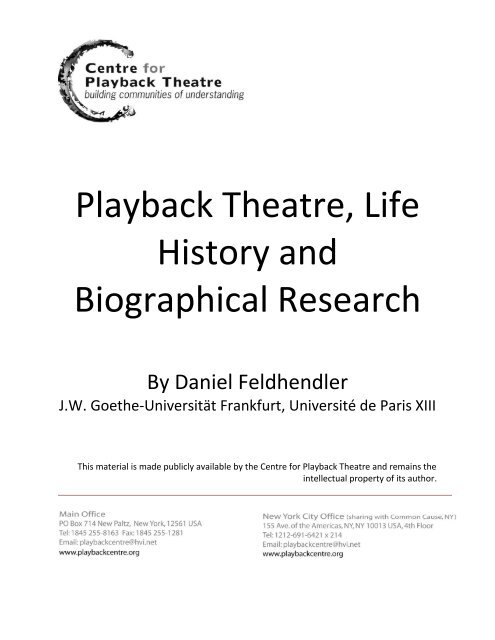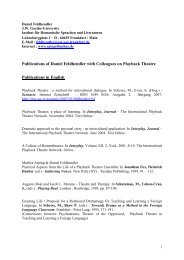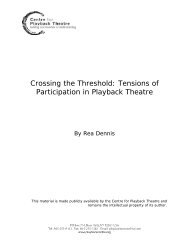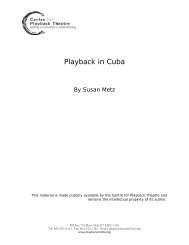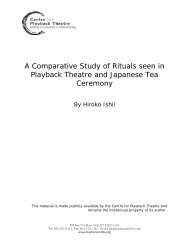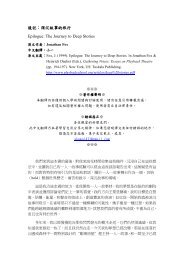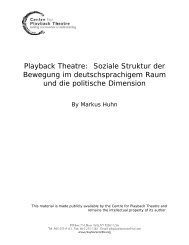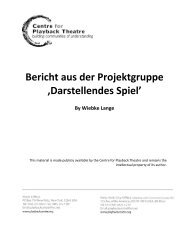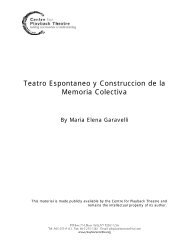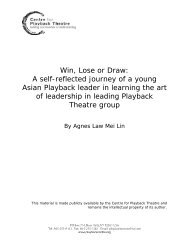Playback Theatre, Life History and Biographical Research
Playback Theatre, Life History and Biographical Research
Playback Theatre, Life History and Biographical Research
You also want an ePaper? Increase the reach of your titles
YUMPU automatically turns print PDFs into web optimized ePapers that Google loves.
<strong>Playback</strong> <strong>Theatre</strong>, <strong>Life</strong><br />
<strong>History</strong> <strong>and</strong><br />
<strong>Biographical</strong> <strong>Research</strong><br />
By Daniel Feldhendler<br />
J.W. Goethe-Universität Frankfurt, Université de Paris XIII<br />
This material is made publicly available by the Centre for <strong>Playback</strong> <strong>Theatre</strong> <strong>and</strong> remains the<br />
intellectual property of its author.
Centre for <strong>Playback</strong> <strong>Theatre</strong> www.playbackcentre.org<br />
<strong>Playback</strong> <strong>Theatre</strong>, <strong>Life</strong> <strong>History</strong> <strong>and</strong> biographical <strong>Research</strong><br />
Daniel Feldhendler<br />
J.W. Goethe-Universität Frankfurt, Université de Paris XIII<br />
Since its beginnings in 1975, <strong>Playback</strong> <strong>Theatre</strong> has developed new potentialities as action<br />
method for public intervention <strong>and</strong> social change. The fact that this approach has spread so<br />
fast around the world is an expression of its appropriateness to our times <strong>and</strong> its<br />
methodological properties in the prevailing social discourse. The method provides dynamic<br />
investigation through symbolic interaction with individuals <strong>and</strong> groups. It encourages<br />
dialogue by building connection between people <strong>and</strong> it affirms their role as co-determining<br />
subjects of their own life <strong>and</strong> lived stories.<br />
<strong>Life</strong> history has been given many meanings in several scientific fields. It can refer to a variety<br />
of methods used for conducting qualitative narrative interviews. <strong>Biographical</strong> research has<br />
advanced from the periphery to the centre of scientific adult education from the „biographic<br />
turn‟ since the 1970s – which refers back to the Chicago School of sociology of the 1920s – to<br />
new educational debate about life paths, biography <strong>and</strong> lifelong learning. Some approaches to<br />
lifelong learning are conceptually close to the idea of reflexivity, which has become a central<br />
preoccupation of mainstream social science. The consciousness of one‟s own biography <strong>and</strong><br />
developing reflexivity as act of historicity (concept of „biographicity‟, Alheit 2007) is<br />
considered by some sociologists to be “a survival necessity in a more individualised,<br />
perpetually changing, paradoxical risk inducing culture” (West et al., 2007). Using<br />
biographical <strong>and</strong> life history approaches in the study of adult <strong>and</strong> lifelong learning opens up<br />
new perspectives in the development of Europe in a globalised world.<br />
<strong>Playback</strong> <strong>Theatre</strong> as an oral form of Story Telling has similarities with <strong>Life</strong> Story Approaches<br />
<strong>and</strong> it bears potentialities for reflexivity <strong>and</strong> participatory action research especially in social<br />
<strong>and</strong> education fields: in the interdisciplinary study of lifelong learning processes defined as a<br />
biographical approach to life history.<br />
The playback specific form is a qualitative setting for hearing <strong>and</strong> underst<strong>and</strong>ing life stories in<br />
a process of reflexivity by dialectic restitution. The process allows the creation of a privileged<br />
space, a place of narration to tell one‟s own story <strong>and</strong> see it in relation to those of others.<br />
Using an aesthetic mediation catalyses the process of putting personal experience into social<br />
context. The <strong>Playback</strong> <strong>Theatre</strong> approach offers a frame for telling personal life stories so as to<br />
talk to each other <strong>and</strong> see one another in a transitive way: a theatre where human beings<br />
become social actors, both agent <strong>and</strong> subject of their stories as collective life histories.<br />
The dialectic of the narrative process has been described by French philosopher Paul Ricoeur<br />
(1990): Encountering Self as an Other <strong>and</strong> discovering Oneself as Another. Connecting life<br />
stories opens up to identity building through narrative identity. In the <strong>Playback</strong> <strong>Theatre</strong><br />
process, the playing out of life stories has further the qualities of dynamic anthropology,<br />
social investigation <strong>and</strong> intervention, understood as cross cultural hermeneutic<br />
phenomenology. It is a process whereby the underlying political <strong>and</strong> social dimensions<br />
become apparent: one can develop the kinds of social bonds which take into account the<br />
singularities <strong>and</strong> self-expression of the individual, while at the same time acting as catalyst for<br />
a dynamic of mediation which focuses on reliance, relation building <strong>and</strong> synergy between, the<br />
Self <strong>and</strong> the Other, the individual <strong>and</strong> the society.<br />
1
Centre for <strong>Playback</strong> <strong>Theatre</strong> www.playbackcentre.org<br />
The purpose of my lecture is to revisit the practice <strong>and</strong> theory of <strong>Playback</strong> <strong>Theatre</strong> in relation<br />
to biographical <strong>and</strong> life history approaches to establishing dialogue between these fields.<br />
A series of meaningful questions emerges:<br />
What kinds of connections are to establish between <strong>Playback</strong> <strong>Theatre</strong> <strong>and</strong> academic fields<br />
What kinds of connections exist between <strong>Playback</strong> <strong>Theatre</strong> <strong>and</strong> biographical research<br />
What are biographical <strong>and</strong> life history approaches<br />
What could biographical research learn from the practice <strong>and</strong> theory of <strong>Playback</strong> <strong>Theatre</strong><br />
What could <strong>Playback</strong> <strong>Theatre</strong> learn from the practice <strong>and</strong> theory of biographical research<br />
What kind of knowledge, research <strong>and</strong> practice do our societies need in a globalised world<br />
<strong>Life</strong> <strong>History</strong> <strong>and</strong> biographical research<br />
<strong>Life</strong> history <strong>and</strong> biographical research as study of the Human Condition (Arendt) in modern<br />
societies through investigation of life <strong>and</strong> environment ("lifeworld", Lebenswelt) could be<br />
understood as “the interplay of learning across people‟s lives - formal, informal <strong>and</strong> intimate –<br />
<strong>and</strong> how to make sense of this”, using interdisciplinary perspectives in diverse ways <strong>and</strong><br />
settings. “It encompasses learning in the workplace, in families, communities, schools,<br />
colleges <strong>and</strong> universities, as well as in the professions, <strong>and</strong> in managing processes of<br />
migration <strong>and</strong> building new social movements” (West et al., 2007).<br />
Today, life history <strong>and</strong> biographical research connect particularly with the following fields:<br />
Ethnography, Anthropology, <strong>History</strong>, Philosophy, Sociology, Psychology – Psychoanalysis,<br />
Sciences Education – Human Sciences, Language <strong>and</strong> Literature, Cultural Studies, Art &<br />
aesthetic Education.<br />
<strong>Life</strong> history <strong>and</strong> biographical research is increasingly being implemented as human sciences,<br />
in social science <strong>and</strong> education departments in universities <strong>and</strong> international research<br />
networks. Alheit <strong>and</strong> Dausien (West et al., 2007: 57) point out that life history as a life long<br />
learning process is being seen in the emerging interdisciplinary fields in European adult<br />
education projects.<br />
In order to underst<strong>and</strong> this evolution better, I will focus on three main academic research<br />
networks in Europe (languages: German, English, French - other places <strong>and</strong> languages have<br />
not been taken into consideration):<br />
<br />
<br />
<br />
Networks in Germany<br />
European Networks (English-speaking)<br />
International Networks (French-speaking).<br />
2
Centre for <strong>Playback</strong> <strong>Theatre</strong> www.playbackcentre.org<br />
<strong>Biographical</strong> <strong>Research</strong> Networks in Europe<br />
- Networks in Germany<br />
<strong>Research</strong> networks are set up in the human sciences. Since the 1970s a large range of<br />
important publications have emerged. At the end of the 20th century, h<strong>and</strong>books <strong>and</strong> other<br />
publications point to the importance of biographical research in scientific discourse (see<br />
Jüttemann & Thomae, 1999 – Krüger & Marotzki, 1999 – Hansen-Schaberg, 1997 - Dan Bar<br />
On, 1993 – Rosenthal, 1995 – Backe & Schulze, 1979 - <strong>and</strong> many other publications, such as<br />
Petzold, 2003).<br />
Particular application in the fields of sociology <strong>and</strong> education has been seen, where<br />
interrelated networks have been developed (the research group set up in 1979 became, in<br />
1986, a section called "Biografieforschung" - biographical research, of the German Society<br />
for Sociology). This network is closely connected to the German Society of Science Education<br />
(DGFE, founded in 1964). In this network, the Biography <strong>Research</strong> Group was first set up in<br />
1978, <strong>and</strong> then in 1994, established as a permanent research group (Arbeitsgemeinschaft<br />
Erziehungswissenschaftliche Biographieforschung), which in 1998 became part of Section 2<br />
of the German Society of Science Education.<br />
One of the initiators of biographical research in German sociological <strong>and</strong> educational fields is<br />
also the co-founder of ESREA: Peter Alheit, of the University of Göttingen, Department of<br />
Education, Section for Biography <strong>and</strong> <strong>Life</strong> Environmental <strong>Research</strong>.<br />
- European Networks (English- speaking)<br />
European Society for <strong>Research</strong> on The Education of Adults (ESREA)<br />
ESREA, according to its own online description “promotes <strong>and</strong> disseminates theoretical <strong>and</strong><br />
empirical research on the education of adults <strong>and</strong> adult learning in Europe through research<br />
networks, conferences <strong>and</strong> publications”. ESREA consists of several networks <strong>and</strong> it has 7<br />
networks, with the <strong>Life</strong> <strong>History</strong> <strong>and</strong> <strong>Biographical</strong> <strong>Research</strong> Network being founded in 1991.<br />
A prominent co-founder of ESREA, Linden West (Canterbury Christ Church University) is<br />
co-editor of an important publication about the current evolution of the life history <strong>and</strong><br />
<strong>Biographical</strong> <strong>Research</strong> Network in Europe (See West et al., 2007).<br />
- International Networks (French-speaking)<br />
Association Internationale des Histoires de vie en formation (ASIHVIF).<br />
The first meetings in 1980 took place in Montreal, Geneva <strong>and</strong> Paris. The international<br />
association was founded in 1990.<br />
Prominent co-founders <strong>and</strong> researchers of ASIHVIF are: Gaston Pineau (University of Tours,<br />
France), Pierre Dominicé (University of Geneva, Switzerl<strong>and</strong>), <strong>and</strong> Guy de Villers<br />
(University of Louvain, Belgium). The first international conference took place in 1986 at the<br />
University of Tours. Gaston Pineau also organised in 2007 the second world conference of<br />
French-speaking networks on Biography <strong>Research</strong> (with more than 420 participants <strong>and</strong> 116<br />
lectures on Biography <strong>Research</strong> (See Colloque International: le Biographique, La Réflexivité<br />
et les Temporalités, Tours, 2007).<br />
3
Centre for <strong>Playback</strong> <strong>Theatre</strong> www.playbackcentre.org<br />
Approaches to <strong>Life</strong> <strong>History</strong> <strong>and</strong> their Development in National Contexts<br />
In 2007, ESREA researchers published a very valuable overview of European developments:<br />
Using <strong>Biographical</strong> <strong>and</strong> <strong>Life</strong> <strong>History</strong> Approaches<br />
in the Study of Adult <strong>and</strong> <strong>Life</strong>long learning: Perspectives from across Europe.<br />
The editors, Linden West, Barbara Merrill, Peter Alheit, Anders Siig Andersen, <strong>and</strong> other<br />
contributors provide some backgrounds to the emergence <strong>and</strong> use of biographical <strong>and</strong> of life<br />
history methodologies in specific countries <strong>and</strong> linguistic communities of the European<br />
Union.<br />
They point out:<br />
“Reference is made to the values that inform the biographical turn <strong>and</strong> life history turn,<br />
<strong>and</strong> to the philosophical <strong>and</strong> disciplinary influences at work. There is a concern with<br />
the ontological <strong>and</strong> epistemological assumptions underlying research: about how the<br />
world, including research, works; about the nature of being through research. <strong>Life</strong><br />
history <strong>and</strong> biography are not simply a set of technical procedures to be applied but<br />
contain a range of assumptions about human beings, the social world, the nature of<br />
knowledge, as well as values to do with what research is for <strong>and</strong> how we should<br />
engage with the „other‟. It can be observed in passing, that the various traditions in the<br />
„family‟ of life history <strong>and</strong> biographical approaches often tend, rhetorically, to relate<br />
their work to a range of historical <strong>and</strong> philosophical influences, including<br />
phenomenology, The Chicago School, Max Weber, The Frankfurt School,<br />
psychoanalysis or more recently feminism. We may note how the focus of research<br />
can vary: some researchers are more preoccupied with the totality of individual lives –<br />
as a basis for building case studies – <strong>and</strong> with engaging, in depth, with complex<br />
features of these lives or the narratives told about them” (West et al., 2007: 27).<br />
The contributors of ESREA publication further point out that the focus is more deliberately on<br />
research <strong>and</strong> the use <strong>and</strong> potential of biographical <strong>and</strong> life history approaches in the “study” of<br />
adult <strong>and</strong> lifelong learning:<br />
“A broad disciplinary range, while there is a significant endeavour to explore <strong>and</strong> map<br />
the borderl<strong>and</strong>s of relevance between the disciplines, Critical theory, psychoanalysis,<br />
narrative <strong>and</strong> post-positivist perspectives – these <strong>and</strong> more are brought to bear at<br />
interdisciplinary interstices relevant to adult learning. Moreover biographies, in their<br />
complexities, tend to challenge, confound even, conventional academic boundaries.<br />
The impact of individual nations‟ socio-culture, history <strong>and</strong> economics on research<br />
cultures, methodological approaches, including processes of data collection <strong>and</strong> their<br />
interpretation, are better understood as a result of the work of the ESREA Biography<br />
<strong>and</strong> <strong>Life</strong> <strong>History</strong> network” (West et al., 2007: 7).<br />
As Linden West <strong>and</strong> others contributing to the opening <strong>and</strong> closing chapters have noted:<br />
“approaches using the same names may be based on different epistemological <strong>and</strong><br />
ontological premises – particularly with respect to the desirability <strong>and</strong> possibility of<br />
achieving objectivity <strong>and</strong>/or ways in which to incorporate subjectivity, including that<br />
of the researcher, reflexively <strong>and</strong> ethically, in the narrative”.<br />
4
Centre for <strong>Playback</strong> <strong>Theatre</strong> www.playbackcentre.org<br />
The <strong>Biographical</strong> Turn<br />
The volume issued by ESREA researchers offers a pathway to knowledge, to probe “into a<br />
whole series of reflexive explorations: of what it means to research, to teach <strong>and</strong> to learn, to<br />
be a researcher <strong>and</strong> or a facilitator of learning, <strong>and</strong> in bringing the researcher <strong>and</strong> researched<br />
into a new relational dynamic through the inclusion of participants‟ voices not only as<br />
narrative data but also as co-inquirers” (West et al., 2007: 27).<br />
The editors point out important themes:<br />
<br />
In the human sciences, life history <strong>and</strong> biographical perspectives have been present, over a<br />
long period, in continental European streams. They became a ‘turn’ (with its connotation of a<br />
major movement) with the development of a range of methods for collecting ‘data’ in the form<br />
of (narrative) autobiographical interviews. The process was also facilitated by the growing<br />
influence of ‘interpretative/hermeneutic’ as well as more critical epistemologies. Symbolic<br />
interactionism derived from American sociology, has an important place in the hermeneutic<br />
project, as has the Frankfurt School in encouraging a focus on repressive social norms.<br />
<br />
The application of biographical methods in social science – the 'biographical turn' of the 1970s<br />
has partly to be understood as a reaction against forms of research which marginalised the<br />
perspectives of subjects themselves or reduced subjective processes, including learning, to<br />
overly abstract entities.<br />
<br />
If biography or life history has become a trend of our time, paradoxically it goes against the<br />
powerful contrary trends in mainstream educational research. <strong>Research</strong>ers are increasingly<br />
driven towards producing ‘useful’ information that will lead to direct improvement in st<strong>and</strong>ards<br />
of teaching <strong>and</strong> learning in schools <strong>and</strong> other educational institutions. In education,<br />
biographical research has combined with more humanistic ways of theorising learning <strong>and</strong><br />
education, <strong>and</strong> pedagogical practices, focusing, for instance, on personal development <strong>and</strong><br />
growth.<br />
<br />
A need for mindfulness comes into play, in both research <strong>and</strong> in the process of educating<br />
students to think about the connectedness of learning, formally <strong>and</strong> informally, intimately <strong>and</strong><br />
in public spheres. Delicate but historically important professional <strong>and</strong> academic, public <strong>and</strong><br />
private distinctions blur, extending the boundaries of practice <strong>and</strong> the margins of<br />
interdisciplinary <strong>and</strong> epistemological possibilities.<br />
<br />
<strong>Biographical</strong> research goes beyond global-regional-national-local boundaries as well as<br />
disciplines <strong>and</strong> professions, as a result of the local, personal <strong>and</strong> intimate impact of<br />
globalisation on individual life trajectories.<br />
<br />
The need to develop a wider sensitivity to such dynamics lies at the core of the project to<br />
nurture European perspectives.<br />
<br />
Achieving mainstream acceptance requires further work to link policy makers <strong>and</strong> researchers.<br />
5
Centre for <strong>Playback</strong> <strong>Theatre</strong> www.playbackcentre.org<br />
The Chicago School<br />
The editors of ESREA publication described the seminal influence of The Chicago School for<br />
<strong>Biographical</strong> <strong>Research</strong> in the following general terms (West et al., 2007: 28):<br />
<br />
The Chicago School emerged around 1920 with the urban research of sociologists (Park <strong>and</strong><br />
Burgess). The influence of Thomas, as well as Mead, in the development of the School was<br />
considerable.<br />
<br />
The Chicago sociologists were engaged in intensive field work: they studied immigrants or<br />
other groups in their own environment, using various methods of inquiry <strong>and</strong> obtained both<br />
quantitative <strong>and</strong> qualitative data. They preferred the case study as the most useful approach.<br />
An important way of building case studies was via participant observation. They utilised<br />
personal documents such as autobiographical writings.<br />
<br />
Thomas <strong>and</strong> Znaniecki had an important contribution through their comprehensive study: “The<br />
Polish Peasant in Europe <strong>and</strong> America” (1918-20). For the authors, personal documents<br />
provided the basis for theoretical exploration of what they defined as the disintegration<br />
process faced by immigrants. Their interest also encompassed the integration <strong>and</strong><br />
reintegration of individuals <strong>and</strong> their families into new lives <strong>and</strong> cultures.<br />
<br />
Thomas <strong>and</strong> Znaniecki believed autobiography enabled researchers to get close to the prime<br />
characteristics of an individual life, <strong>and</strong> those of a group.<br />
<br />
Through autobiography, the sociologists could gain insight into an individual life’s process <strong>and</strong><br />
his/her interaction with others. A strong theoretical influence in Chicago School sociology was<br />
symbolic interactionism understood as regarding the members of society as actors (as social<br />
actors). The social order is created in, by <strong>and</strong> through interactions between the members of a<br />
society. <strong>Biographical</strong> <strong>and</strong> life history researchers tend to take it as axiomatic.<br />
<br />
Mention should also be made of the influences of Oral <strong>History</strong> in the development of life<br />
history <strong>and</strong> biographical approaches. Oral history emerged as part of a wider movement to<br />
give voice to those silenced by dominant perspectives. Oral historians have engaged in<br />
debates about the nature of memory <strong>and</strong> truth in oral accounts, the interplay of past <strong>and</strong><br />
present as well as processes of interpretation (emphasising that written texts are always <strong>and</strong><br />
inevitably interpretations of events rather than representing the events themselves, as do oral<br />
narratives).<br />
The Chicago School represents the birth of American sociology. <strong>Research</strong>ers had to leave the<br />
academic environment to do field work in social contexts: they combined approaches of<br />
ethnology with sociology. It was the first step towards Action-<strong>Research</strong> with active<br />
participative observation.<br />
6
Centre for <strong>Playback</strong> <strong>Theatre</strong> www.playbackcentre.org<br />
Developments on Biography-<strong>Research</strong> in French-Speaking Networks<br />
<strong>Biographical</strong> research in French-speaking contexts has three main references: sociology,<br />
psycho-sociology <strong>and</strong> adult education (West et al., 2007: 44).<br />
French sociologists drew on a long heritage stemming from philosophers who gave space to<br />
notions of the „self‟ (Delory-Momberger, 2000, 2005); another influence was the Chicago<br />
School <strong>and</strong> its modern developments. A third sociological influence emerged from the events<br />
of 1968, which have guided many sociologists to reconsider narratives as a valid scientific<br />
instrument. Daniel Bertaux (1976, 1997) remains a major reference in this approach.<br />
French psycho-sociology streams which have been developed after 1968 have a stronger<br />
critical vision of society. Some French researchers focus on “institutional analysis” such as<br />
Lourau (1970) <strong>and</strong> Lapassade (1974) <strong>and</strong> in Action-<strong>Research</strong> (Barbier, 1977). In the search<br />
for new ways of increasing personal development practices <strong>and</strong> psycho-sociological<br />
investigation, a movement led by Vincent de Gaulejac emerged (1987, 1999).<br />
The third stream of research using biographies in the French-speaking world relates, as stated,<br />
to adult education <strong>and</strong> learning processes. From 1980, first Gaston Pineau (Quebec,<br />
Canada/Tours, France), Pierre Dominicé (Geneva, Switzerl<strong>and</strong>), Guy de Villers (Louvain,<br />
Belgium) developed common goals:<br />
“Through their dialogue, respective life trajectories <strong>and</strong> fields of interest they created<br />
<strong>and</strong> lent solidity to a body of thought which has become a reference in the matter of<br />
life history in adult education. Stimulated by various currents in philosophy,<br />
psychology, sociology, they share a common concern for the democratic aspects of<br />
continuing education” (Ollagnier, in West et al., 2007: 45).<br />
Through the main efforts of the three researchers, among other, a French-speaking network<br />
was established in 1990 (ASIHVIF - International Association for <strong>Life</strong> <strong>History</strong> in Adult<br />
Education). The Charter of the Association states:<br />
“The purpose of the Association is to promote life history as a social approach in the<br />
area of continuing education. The members aim to develop it through their activities in<br />
research, education <strong>and</strong> training <strong>and</strong> through publications. <strong>Research</strong> is meant to clarify<br />
the practice of life history in the field of education <strong>and</strong> training. Education <strong>and</strong> training<br />
shall be based on the results of research” (West et al., 2007: 45).<br />
West points further out:<br />
Members of the Association agree on three basic principles with regard to life<br />
history‟s educational dimensions:<br />
hermeneutical (making sense of one‟s life),<br />
potentially emancipatory (the ability to position oneself amongst others),<br />
action-oriented (action planning).<br />
One of the main intellectual references to French-speaking biographical research is Paul<br />
Ricoeur (1913-2005), which combined phenomenological description with hermeneutic<br />
interpretation. The trilogy of Time <strong>and</strong> Narrative (1983, 1984, 1985) <strong>and</strong> Oneself as Another<br />
(1990) give the fundaments to an approach of “Narrative Identity”.<br />
7
Centre for <strong>Playback</strong> <strong>Theatre</strong> www.playbackcentre.org<br />
Ricoeur‟s aim is to reconstruct the mediations required in order to connect the question of<br />
narrative with that of time. The essence: Human time is the time of our life stories, considered<br />
either at an individual level or at a collective level as the history of our communities. As such,<br />
narratives preserve the memory of what deserved to be remembered. An individual or<br />
collective entity can be only identified through the act of Narrative: « Dire l‟identité d‟une<br />
communauté ou d‟un individu, c‟est répondre à la question: qui a fait telle action, qui en est<br />
l‟agent, l‟auteur (…) La réponse ne peut être que narrative. Répondre à la question « qui »,<br />
comme l‟avait fortement dit Hannah Arendt, c‟est raconter l‟histoire d‟une vie. L‟histoire<br />
racontée dit le qui de l‟action. L’identité du qui n’est donc elle-même qu’une identité<br />
narrative » (Ricœur, 1985: 355).<br />
The Emergence of New Developments in <strong>Playback</strong> <strong>Theatre</strong><br />
<strong>Playback</strong> <strong>Theatre</strong> can be understood as the sharing of biographical moments in narrative form,<br />
through their immediate transformation into a dynamic mirroring. What is shared becomes<br />
incorporated into one's resource for self-knowledge or perception of oneself <strong>and</strong> others. The<br />
method becomes a medium of communication – both magnifying glass <strong>and</strong> megaphone at the<br />
same time - between the individual <strong>and</strong> the group. A third dimension emerges symbolically<br />
between Self <strong>and</strong> Society. Thus <strong>Playback</strong> <strong>Theatre</strong> shows itself to be an important tool for<br />
identity work: it enables <strong>and</strong> promotes the formation of a "narrative identity“ between the<br />
individual <strong>and</strong> the community. While voicing one's own story in this way means, on the one<br />
h<strong>and</strong>, discovering one's story anew, on the other h<strong>and</strong> it means discovering Oneself as<br />
Another. Being seen <strong>and</strong> heard: it initiates a form of mindfulness for others. The dialogical<br />
value exists in the sharing of one's own lived stories <strong>and</strong> experiences <strong>and</strong> in cooperation with<br />
others, in the here <strong>and</strong> now, bringing them to life, allowing the stories on the stage to have an<br />
effect on one, <strong>and</strong> to examine one's present, personal reality. In this way, new creative paths<br />
<strong>and</strong> processes can be called into existence. A process of acknowledgement as an act of<br />
reflexivity takes place. Paul Ricoeur (2004) <strong>and</strong> Axel Honneth (2003, 2005) converge on this<br />
essential dynamic <strong>and</strong> need of mutual acknowledgement in our conflicted modern societies. In<br />
order to better underst<strong>and</strong> the historical dimension of this point, it is relevant to note that<br />
Honneth is the present Director of the Institute for Social <strong>Research</strong> at the J.W. Goethe<br />
University in Frankfurt (the “Frankfurt School”; among the former directors were Habermas,<br />
Adorno <strong>and</strong> Horkheimer).<br />
On the brink of new Emergencies<br />
At the turn of the millennium, a series of meaningful events emerged in the <strong>Playback</strong> <strong>Theatre</strong><br />
Community. I would like to mention some of these.<br />
Interplay, the newsletter of the IPTN (International <strong>Playback</strong> <strong>Theatre</strong> Network) became a new<br />
online free access version for a larger public. Its editor, Nick Rowe titled Interplay of<br />
December 2001: Tales rescued from oblivion: The construction of Collective Memory. In this<br />
edition, the words of the IPTN President (at that time, Veronica Needa) explained the newly<br />
emerging dimension:<br />
“The shift <strong>and</strong> changes on this planet accelerate. The pulse quickens, <strong>and</strong> our web of<br />
connections, our collective consciousness, sharpens into focus. There is no immunity from<br />
accepting responsibility, we are all involved wherever we are” (2001: 2).<br />
8
Centre for <strong>Playback</strong> <strong>Theatre</strong> www.playbackcentre.org<br />
From 2001, Jonathan Fox <strong>and</strong> faculty members of the School of <strong>Playback</strong> <strong>Theatre</strong> developed<br />
new projects, under the name of "the Libra Project": to use playback theatre in conflicted<br />
communities as a way to restore dialogue. It “implies restoring the balance of historical,<br />
economic, cultural <strong>and</strong> racial inequality through sharing our stories in playback theatre. Such<br />
embodied truth telling between groups with very different perspectives can significantly aid in<br />
the long process of reconciliation” (Centre for <strong>Playback</strong> <strong>Theatre</strong>, online). Bev Hosking taught<br />
in Angola, <strong>and</strong> Jonathan Fox started a program in Burundi funded by a non-governmental<br />
organisation called Search for Common Ground. He worked there with Hutu <strong>and</strong> Tutsi<br />
members of a theatre association, <strong>and</strong> public performances were organised with different<br />
communities of Burundi.<br />
As part of the Libra Project, in 2006 the School of <strong>Playback</strong> <strong>Theatre</strong> organised “a major<br />
initiative to bring playback theatre to residents of the US Gulf region devastated by Hurricane<br />
Katrina. Because so many of the most severely affected are poor <strong>and</strong> persons of colour. The<br />
Centre has a special mission to give them a voice as well as participate in overall disaster<br />
recovery” (Centre for <strong>Playback</strong> <strong>Theatre</strong>, online).<br />
Having gained insight from such experience, Jonathan Fox started, in 2007, the first training<br />
program, entitled Emergency <strong>Playback</strong> Europa, in Budapest, with participants from 10<br />
nations: “when disaster strikes, people desperately need a forum to share their stories”. The<br />
program in Hungary was “designed to provide European playback theatre practitioners with<br />
the tools for delivering playback theatre to communities suffering from a natural or civil<br />
emergency” (Centre for <strong>Playback</strong> <strong>Theatre</strong>, online).<br />
In summer 2008, the Centre for <strong>Playback</strong> <strong>Theatre</strong> will organise a program in New Orleans<br />
(where Hurricane Katrina took place): After the Storm: Mobilizing <strong>Playback</strong> <strong>Theatre</strong> for<br />
Communities in Crisis. The program focuses on “the complex skill set needed for delivering<br />
playback theatre to troubled communities, whether from climate, change, violence, or<br />
immigration issues”. The program emphasises:<br />
<br />
<br />
<br />
the social awareness needed to bring assistance in an ethical manner<br />
a focus on the participants‟ own communities <strong>and</strong> concrete opportunities for crisis<br />
intervention<br />
proposals for developing projects in own communities.<br />
The School of <strong>Playback</strong> <strong>Theatre</strong> is now transmuted into a resource institution, the resource<br />
Centre for <strong>Playback</strong> <strong>Theatre</strong>, to support world wide projects aimed at “building communities<br />
of underst<strong>and</strong>ing”.<br />
At the beginning of the 21st century, <strong>Playback</strong> <strong>Theatre</strong> has advanced to being a<br />
comprehensive action-research method for investigation <strong>and</strong> intervention in educational <strong>and</strong><br />
social fields.<br />
9
Centre for <strong>Playback</strong> <strong>Theatre</strong> www.playbackcentre.org<br />
References <strong>and</strong> Resources<br />
Adorno, T. W. (1971). Erziehung zur Mündigkeit. Frankfurt : Suhrkamp.<br />
Arendt, H. (1994). Condition de l’homme moderne. Paris : Calmann-Lévy.<br />
Artières, P. & Zancarini-Fournel, M. (Ed.) (2008). 68 Une histoire collective. Paris : La<br />
Découverte.<br />
Baacke, D. & Schulze, T. (1993). Aus Geschichten lernen. Weinheim : Juventa.<br />
Barbier, R. (1996). La Recherche Action. Paris: Anthropos.<br />
Bar-On, D. (2003). Die Last des Schweigens. Hamburg : Edition Körber-Stiftung.<br />
Bar-On, D. (2004). Erzähl Dein Leben! Hamburg : Edition Körber-Stiftung.<br />
Bar-On, D. (2006). Die Anderen in uns. Hamburg : Edition Körber-Stiftung.<br />
Beck, U. (1986). Risikogesellschaft. Frankfurt : Suhrkamp.<br />
Bertaux, D. (1997). Les récits de vie. Paris : Nathan.<br />
Colloque International (2007). le Biographique, La Réflexivité et les Temporalités. Université<br />
de Tours : Tours.<br />
Bülow-Schramm, M.; Gipser, D. ; Krohn, D. (Hrsg.) (2007). Bühne frei für<br />
Forschungstheater. Theatrale Inszenierungen als wissenschaftlicher Erkenntnisprozess.<br />
Oldenburg : Paulo Freire Verlag<br />
De Gaulejac, V. (1987). La névrose de classe. Paris : Hommes et Groupes Editeurs.<br />
De Gaulejac, V. (1999). L’histoire en héritage. Paris : Desclée de Brouwer.<br />
Delory-Momberger, C. (2000). Les histoires de vie. De l’invention de soi au projet de<br />
formation. Paris : Anthropos.<br />
Delory-Momberger, C. (2005). Histoire de vie et Recherche biographique en éducation. Paris:<br />
Anthropos.<br />
Dominicé, P. (2002). L’histoire de vie comme processus de formation. Paris : L‟Harmattan.<br />
Feldhendler, D. (2005). Théâtre en miroirs, l’histoire de vie mise en scène. Paris : Téraèdre.<br />
Fox, J. (1987). The Essential Moreno: Writings on Psychodrama, Group Method, <strong>and</strong><br />
Spontaneity. New York : Springer.<br />
Fox, J. (1994). Acts of Service. Spontaneity, Commitment, Tradition, in the Non Scripted<br />
<strong>Theatre</strong>. New Paltz: Tusitala Publishing.<br />
Fox, J., & Dauber, H. (1999). Gathering Voices, essays on playback theatre. New Paltz:<br />
Tusitala Publishing.<br />
Habermas, J. (1968). Erkenntnis und Interesse. Frankfurt : Suhrkamp.<br />
Habermas, J. (1981). Theorie des kommunikativen H<strong>and</strong>elns, Bd. 1,2. Frankfurt : Suhrkamp.<br />
Habermas, J. (1982). Zur Logik der Sozialwissenschaften. Frankfurt : Suhrkamp.<br />
Halbwachs, M. (1997). La mémoire collective. Paris : Albin Michel.<br />
Hansen-Schaberg, I. (Hrsg.) (1997). „Etwas erzählen“: die lebensgeschichtliche Dimension in<br />
der Pädagogik. Hohengehren : Schneider Verlag<br />
Hess, R. & Weig<strong>and</strong>, G. (2006). L’observation participante. Paris: Anthropos.<br />
Honneth, A. (2003). Unsichtbarkeit. Frankfurt : Suhrkamp.<br />
Honneth, A. (2005). Verdinglichung. Frankfurt : Suhrkamp.<br />
Jüttemann, G. & Thomae, H. (Hrsg.) (1998). Biographische Methoden in den<br />
Humanwissenschaften. Weinheim : Beltz.<br />
Koch, G. ; Roth, S.; Vaßen, F.; Wrentschur, M. (Hrsg.) (2004). Theaterarbeit in sozialen<br />
Feldern. Frankfurt : Br<strong>and</strong>es & Apsel.<br />
Krüger, H-H & Marotzki, W. (Hrsg.) (1999). H<strong>and</strong>buch erziehungswissenschaftliche<br />
Biographieforschung. Opladen : Leske + Budrich.<br />
Lapassade, G. (1974). Groupe, organisation, institution. Paris : Gauthier-Villars<br />
Lourau, R. (1970). L’analyse institutionnelle. Paris : Minuit.<br />
Petzold, H.G. (Hrsg.) (2003). Lebensgeschichten erzählen. Paderborn : Junfermann.<br />
10
Centre for <strong>Playback</strong> <strong>Theatre</strong> www.playbackcentre.org<br />
Pineau, G., & Le Gr<strong>and</strong>, J.L. (2002). Les histoires de vie. Paris : Presses Universitaires de<br />
France.<br />
Ricœur, P. (1983). Temps et récit. Tome I. Paris : Le Seuil.<br />
Ricœur, P. (1984). Temps et récit. Tome II. Paris : Le Seuil.<br />
Ricœur, P. (1985). Temps et récit. Tome III. Paris : Le Seuil.<br />
Ricœur, P. (1990). Soi-même comme un Autre. Paris : Le Seuil.<br />
Ricœur, P. (2000). La Mémoire, L’Histoire, L’Oubli. Paris : Le Seuil.<br />
Ricœur, P. (2004). Parcours de Reconnaissance. Paris : Stock.<br />
Rosenthal, G. (1995). Erlebte und erzählte Lebensgeschichte : Gestalt und Struktur<br />
biographischer Selbstbeschreibungen. Frankfurt: Campus.<br />
Rowe, N. (2007). Playing the Other : Dramatizing Personal Narratives in <strong>Playback</strong> <strong>Theatre</strong>.<br />
London: Jessica Kingsley.<br />
Salas, J. (1998). Improvising Real <strong>Life</strong>. Personal Story in <strong>Playback</strong> <strong>Theatre</strong>. New Paltz:<br />
Tusitala Publishing.<br />
Salas, J. & Gauna, L. (2007). Half of my Heart. True stories told by immigrants in Dutchess<br />
County, New York. New Paltz : Hudson River <strong>Playback</strong> <strong>Theatre</strong>.<br />
West, L.; Merrill, B.; Alheit, P.; Siig Andersen, A. (2007). Using <strong>Biographical</strong> <strong>and</strong> <strong>Life</strong><br />
<strong>History</strong> Approaches in the Study of Adult <strong>and</strong> <strong>Life</strong>long learning: Perspectives from across<br />
Europe. Frankfurt am Main : Peter Lang.<br />
11


